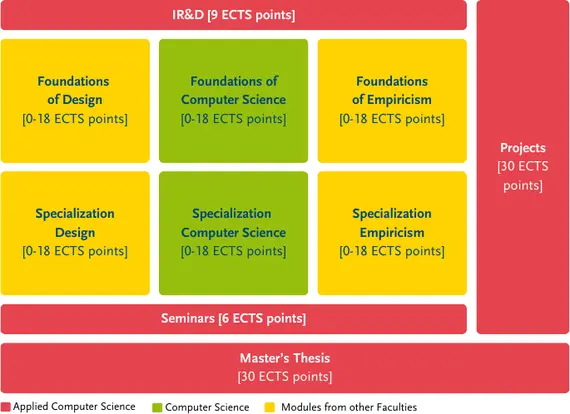Structure and Curriculum
The degree programme builds directly on the respective knowledge and experience of the students and offers the option of broadening or deepening in three pillars: Design, Empiricism, Computer Science. The three pillars are equally important and equally weighted. In each pillar, a foundation programme of 0 to 18 ECTS credits and a specialisation programme of the same scope are provided. The ECTS credits mentioned can be freely selected and can therefore compensate for personal deficits in the programme or further expand knowledge in your own areas of interest.
The master’s degree programme comprises the seven module groups outlined below.
Particular importance is placed on guided individual studies represented by at least two master’s seminars, up to two research-oriented projects—each with 15 ECTS credit points—and a master’s thesis comprising 30 ECTS credit points.
Module plan
Module plan Master IRD(227.8 KB)
This provides a basic introduction to the subject, which serves as a foundation for the other module groups. In module group A1, the courses Human-Computer Interaction and Propaedeutic Human-Computer Interaction with a total of 9 ECTS credits must be completed as compulsory modules.
Central paradigms, concepts and methods for the design of innovative systems are taught here. In module group A2, 0-18 ECTS points are to be earned in the basic area and also 0-18 ECTS in the in-depth area. All modules can be chosen by the students themselves. The in-depth modules can be chosen according to the recommended previous knowledge (also from the own Bachelor's programme and without having completed all basic modules from A2).
Central paradigms, concepts and methods for recording and analysing user requirements and wishes are taught here. In module group A4, 0-18 ECTS points are to be earned in the basic area and also 0-18 ECTS in the in-depth area. All modules can be chosen by the students themselves. The in-depth modules can be chosen according to the recommended previous knowledge (also from the own Bachelor's degree and without having completed all basic modules from A4).
Central paradigms, concepts and methods for the design and development of innovative systems are taught here. In module group A3, 0-18 ECTS points are to be earned in the basic area and also 0-18 ECTS in the in-depth area. All modules can be chosen by the students themselves. The in-depth modules can be chosen according to the recommended previous knowledge (also from the own Bachelor's degree and without having completed all basic modules from A3).
In module group A5, two modules with 15 ECTS each must be completed. All project modules must be from the field of applied computer science. Each project module must be related to at least two of the topics design, empiricism and computer science. The module examination is carried out in the form of a written paper with a colloquium.
In module group A6, two seminar modules from applied computer science must be completed, each with a total of 3 ECTS credits. The module examination in each seminar is a presentation with a written paper.
In module group A7, the module Master's thesis must be completed to the extent of 30 ECTS credits. The topic of the Master's thesis must be related to at least two of the topics design, empirical studies and computer science. The module examination is taken in the form of a written paper with a processing time of six months and a colloquium.
Continue to Application and Admission.
